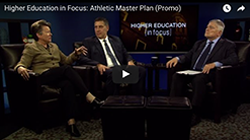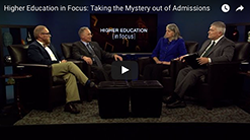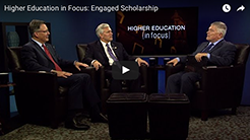New Student Veteran Center to serve those who’ve served
Each year on Veterans Day I like to reflect on and honor those who have so bravely served our country. It is a rare privilege to live in a nation that has never had enemy troops march through our cities, and we have largely been shielded from the physical toll of war — thanks to the dedication of those willing to serve our country.
Penn State has adopted the tradition of honoring veterans and service members with our annual Military Appreciation Week. This is the eighth year of festivities, and it will focus on America’s Greatest Generation, those who grew up during the Great Depression and fought and served in World War II.
Many of us have personal connections to this generation. I had four uncles who served in World War II and my father was a paratrooper in the Pacific theater. The experience was profound, and it was followed by the opportunity to gain a college education on the GI Bill. Thousands of Penn Staters were among the 16 million Americans who served during WWII. Among the Penn Staters who fought in the war were future University presidents Milton S. Eisenhower and John Oswald, along with a number of students, including William Garfield Thomas, a sailor and the first Penn Stater to lose his life in the conflict, and IFC president Eddie Wagner, after whom the current ROTC building at University Park is named. Of this distinguished group, it is estimated that less than 5%, or roughly 400,000 veterans, are still with us today — most 90 years old or older.
Penn State and other universities contributed to the war effort in many ways. I believe, witnessing the impact on my father, that educating service members when the troops returned from war changed the whole trajectory of the United States. Notably, 2019 is the 75-year anniversary of the GI Bill.
One exciting new effort is the opening this week of a new Student Veteran Center in Ritenour Building at University Park. This center will serve as a central hub of services for more than 400 student veterans at University Park and more than 5,000 student veterans at Penn State Commonwealth Campuses across the state, including World Campus.
The Student Veteran Center will be the hub of activity for student veterans, a place of community, and a place where they can take part in peer-to-peer mentoring. In addition to providing a dedicated space for student veterans, the new center will house key services they will require. It’s purposefully located in the core of campus, so it can be an integral part of the fabric of our community.
What’s more, the Student Veteran Center is not only for University Park student veterans — it will serve student veterans studying at other campuses, using livestream video to present workshops on timely topics. Creating a successful environment for veterans is a priority for every Penn State campus.
Opening the Student Veteran Center has long been a goal at Penn State, and donors, friends and institutional support has made it possible. I’m thrilled that we will have the ribbon cutting during Military Appreciation Week.
I hope to see you at some of the other events this week, especially the Military Appreciation Tailgate and Football Game, where I’ll have the chance to personally thank the many veterans and service members who will be in attendance. The all-volunteer tailgate is a tremendous effort, welcoming up to 8,000 active-duty service members, veterans and their families before the game. Thanks to Penn State supporters — who funded over 7,000 tickets through the Seats for Servicemembers program — service members, veterans and military families received free tickets to the game.
This will be a wonderful week of reflection, gratitude and community. I hope you’ll join me in honoring and publicly commending those who have bravely served our country. And I hope you’ll also take a few minutes to see some of the physical reminders of Penn State’s history and commitment to the military on campus, including the bell of the battleship USS Pennsylvania, which was present during the attack on Pearl Harbor; Penn State’s Veteran’s Plaza, a gift from the class of 2011; and even Beaver Stadium, which is named after James A. Beaver, a former Pennsylvania governor and colonel in the Civil War.
Happy Veterans Day!




